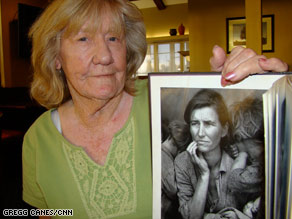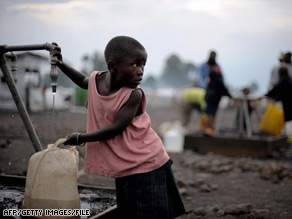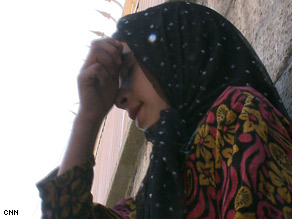



'Fashion' 카테고리의 다른 글
| Red Carpet (0) | 2008.12.20 |
|---|---|
| Look of the day (0) | 2008.12.14 |
| tea time (0) | 2008.12.14 |
| Roberto Cavalli (0) | 2008.12.14 |
| Metallic Makeup (0) | 2008.12.14 |




| Red Carpet (0) | 2008.12.20 |
|---|---|
| Look of the day (0) | 2008.12.14 |
| tea time (0) | 2008.12.14 |
| Roberto Cavalli (0) | 2008.12.14 |
| Metallic Makeup (0) | 2008.12.14 |
MODESTO, California (CNN) -- The photograph became an icon of the Great Depression: a migrant mother with her children burying their faces in her shoulder. Katherine McIntosh was 4 years old when the photo was snapped. She said it brought shame -- and determination -- to her family.

Katherine McIntosh holds the photograph taken with her mother in 1936.
"I wanted to make sure I never lived like that again," says McIntosh, who turns 77 on Saturday. "We all worked hard and we all had good jobs and we all stayed with it. When we got a home, we stayed with it."
McIntosh is the girl to the left of her mother when you look at the photograph. The picture is best known as "Migrant Mother," a black-and-white photo taken in February or March 1936 by Dorothea Lange of Florence Owens Thompson, then 32, and her children.
Lange was traveling through Nipomo, California, taking photographs of migrant farm workers for the Resettlement Administration. At the time, Thompson had seven children who worked with her in the fields.
"She asked my mother if she could take her picture -- that ... her name would never be published, but it was to help the people in the plight that we were all in, the hard times," McIntosh says.
"So mother let her take the picture, because she thought it
would help." ![]() Watch "we would go home and cry"
»
Watch "we would go home and cry"
»
The next morning, the photo was printed in a local paper, but by then the family had already moved on to another farm, McIntosh says.
"The picture came out in the paper to show the people what
hard times was. People was starving in that camp. There was no food," she says.
"We were ashamed of it. We didn't want no one to know who we were." ![]() Watch a Depression-era daughter's
recollections »
Watch a Depression-era daughter's
recollections »
The photograph helped define the Great Depression, yet McIntosh says her mom didn't let it define her, although the picture "was always talked about in our family."
"It always stayed with her. She always wanted a better life, you know."
Her mother, she says, was a "very strong lady" who liked to have a good time and listen to music, especially the yodeler named Montana Slim. She laughs when she recalls her brothers bringing home a skinny greyhound pooch. "Mom, Montana Slim is outside," they said.
Thompson rushed outside. The boys chuckled. They had named the dog after her favorite musician.
"She was the backbone of our family," McIntosh says of her mom. "We never had a lot, but she always made sure we had something. She didn't eat sometimes, but she made sure us children ate. That's one thing she did do."
Her memories of her youth are filled with about 50 percent good times, 50 percent hard times.
It was nearly impossible to get an education. Children worked the fields with their parents. As soon as they'd get settled at a school, it was time to pick up and move again.
Her mom would put newborns in cotton sacks and pull them along as she picked cotton. The older kids would stay in front, so mom could keep a close eye on them. "We would pick the cotton and pile it up in front of her, and she'd come along and pick it up and put it in her sack," McIntosh says.
They lived in tents or in a car. Local kids would tease them, telling them to clean up and bathe. "They'd tell you, 'Go home and take a bath.' You couldn't very well take a bath when you're out in a car [with] nowhere to go."
She adds, "We'd go home and cry."
McIntosh now cleans homes in the Modesto, California, area. She's proud of the living she's been able to make -- that she has a roof over her head and has been able to maintain a job all these years. She says her obsession to keep things clean started in her youth when her chore was to keep the family tent clean. There were two white sheets that she cleaned each day.
"Even today, when it comes to cleaning, I make sure things are clean. I can't stand dirty things," she says with a laugh.
With the nation sinking into tough economic times and analysts saying the current economic crisis is the worst since the Great Depression, McIntosh says if there's a lesson to be learned from her experience it is to save your money and don't overextend yourself. iReport: Are you worried about losing your job?
"People live from paycheck to paycheck, even people making good money," she says. "Do your best to make sure it doesn't happen again. Elect the people you think is going to do you good."
Her message for President-elect Barack Obama is simple: "Think of the middle-class people."
She says she'll never forget the lessons of her hard-working mother, who died at the age of 80 in 1983. Her gravestone says: "Migrant Mother: A Legend of the strength of American motherhood."
"She was very strict, but very loving and caring. She cared for us all," McIntosh says.
| Searching For My Donor Dad (0) | 2008.12.08 |
|---|---|
| How To Avoid Hidden Holiday Travel Costs (0) | 2008.12.07 |
| Lil Wayne, Coldplay dominate Grammy nominations (0) | 2008.12.04 |
| Home Prices in Record Decline (0) | 2008.11.30 |
| The Ten Best Places to Live (0) | 2008.11.30 |

A girl fills a jug with water at the camp for internally displaced people in Kibati, Congo, on Thursday.
The camp in Kibati, near Goma, is home to thousands of people seeking refuge from warfare between a Tutsi militia and Congolese forces. The fighting is an offshoot of the Hutu-Tutsi animosity that culminated in the 1994 genocide of 800,000 Tutsi and moderate Hutus in neighboring Rwanda.
The U.N. Security Council has approved 3,000 troops to bolster the 17,000-strong peacekeeping force charged with the daunting task of stemming violence in the Democratic Republic of Congo's North Kivu province.
"It's extremely volatile," said Andrej Mahecic, the U.N. High Commissioner for Refugees' spokesman in Geneva, Switzerland.
Mahecic said he did not know whether the gunmen involved in Friday's attack were with the Tutsi militia or Congolese military.
"We have seen both sides doing this," he said.
"The fact that the camps are so close to the front lines is a huge cause of concern for us," Mahecic said.
The agency says there has been "relative calm" in North Kivu this week, allowing officials to develop a displaced persons camp more than 9 miles from Kibati, on the outskirts of Goma, the North Kivu capital. The new camp is supposed to alleviate some of the strain on the burgeoning Kibati camps. ![]() Map of Goma, Congo »
Map of Goma, Congo »
Friday's "incident adds more to the pressure to move these people as soon as possible," Mahecic said.
The warfare between Congolese government forces and rebels under the command of Laurent Nkunda represents the lingering tensions between Hutus and Tutsis in neighboring Rwanda.
Rwandan Hutus who fled to Congo after the massacres feared returning home, believing they would be targeted for revenge by Tutsis, who now dominate the Rwandan government. Rwandan Hutus remained in the jungles of eastern Congo, where they preyed on local residents and participated in Hutu militias.
Nkunda, a Tutsi and former Congolese army general, has repeatedly blamed the Congolese government for not protecting Tutsis from Rwandan Hutus in Congo.
A January cease-fire between Nkunda's forces and the Congolese army fell through in August. Nkunda's forces launched an offensive, and an estimated 250,000 people have fled their homes amid the fighting, which also has drawn in militias allied with the government.
Nkunda declared a unilateral cease-fire October 29, but fighting and reports of atrocities have continued.
The U.N. special envoy to Congo, former Nigerian President Olusegun Obasango, met with Nkunda earlier this week. Rebels pulled back from a strategic area after the meeting.
Jaya Murthy, spokesman for the U.N. Children's Fund in Goma, said that 1.1 million North Kivu residents -- about 20 percent of the population -- have been displaced in violence since December 2006.
Murthy said he heard reports Friday of looting and an unconfirmed report of a person burned alive in Kanyabayonga, north of Goma. Farther north, thousands have fled the town of Kanya and are "hiding in the bush" after fighting there, the U.N. reported.
The U.N. is transporting therapeutic milk by helicopter to Kanya and Kanyabayonga to feed hundreds of malnourished children.
Many civilians are on the move across North Kivu to escape the warfare, Murthy said.
UNICEF has issued a statement on humanitarian conditions in North Kivu, saying there is a "very high risk of child deaths due to malnutrition, malaria, respiratory infections."
Cholera is endemic, it said, and threatens to worsen without latrines and clean water. ![]() Watch how Congo could be on the verge of a health catastrophe »
Watch how Congo could be on the verge of a health catastrophe »
UNICEF offered only one nugget of good news: Two schools in the Kibati settlement have reopened after people who occupied the schools moved out.
In Rutshuru, 85 percent of schools remain closed, affecting 150,000 students. Plans to pass out school kits are under way after Nkunda's group said it would reopen all schools next week.
"Today, there's still insecurity," Murthy said, adding that aid workers have limited access to many areas and a planned humanitarian corridor has yet to open.
Aid organizations have long said the enormous African country -- which borders nine nations and is more than twice the size of Alaska -- is suffering a humanitarian disaster. World Vision says the conflict in Congo, ongoing since 1997, is the deadliest since World War II.
"The last decade of conflict has resulted in some 4 million deaths; an estimated 1,200 people die every day due to ongoing epidemics and war-related causes; some aid agencies estimate upward of 1,400 deaths per day," the Christian relief organization said in a news release.
| 175 pounds lighter, woman takes flight (0) | 2008.11.22 |
|---|---|
| South African teen gets 4 life terms for racist murders (0) | 2008.11.22 |
| Sources: Richardson a 'serious contender' for Commerce job (0) | 2008.11.22 |
| Obama expected to tap Geithner for Treasury (0) | 2008.11.22 |
| Stocks rally on Treasury secretary talk (0) | 2008.11.22 |
KABUL, Afghanistan (CNN) -- Little Banafsha wakes up in her small mud home, has a cup of tea and braces herself for the day ahead.

An exhausted Banafsha takes a moment's rest from begging for bread.
She is just 11 years old but she is the breadwinner for her family. Literally. Without the bread that she begs from strangers, she, her sisters, baby brothers and mom would all go hungry.
Her father is a drug addict, focused only on his next high, her mom cares for the little ones and heavy responsibility falls on Banafsha's young shoulders.
Every day she heads far from her home, trekking up and down steep hills to the wealthier parts of the Afghan capital where she can but hope richer people will take pity on her.
She is not bitter, explaining: "My two younger sisters also work. They beg for bread and sell gum -- there's no choice."
When she gets to the Wazir Akbar Khan district, a hangout of diplomats and aid workers, she unwraps her folded rice sack.
"Sir, do you have some bread?" ![]() Watch Banafsha and other Afghan kids ask for help »
Watch Banafsha and other Afghan kids ask for help »
Banafsha clutches the bag tight as she walks from building to building, eyeing who will help and who will not.
"Sir, do you have some bread?" she asks again.
This is her recitation for the next six hours, as she darts around in her worn blue plastic sandals, knowing that danger could be there at any turn, even in this more affluent neighborhood.
"A few days ago, some girls were kidnapped around here and many people have gone missing. The girls' mother still comes around here looking for them but they still haven't been found," Banafsha says.
This time of the year the sun begins to set at 4:30 p.m. in Kabul. But Banafsha continues to roam the dark streets. The 6 o'clock rush hour is her peak business time.
Her eyes well up with tears, but she doesn't allow them to fall, quickly wiping them away and biting her thumb like the vulnerable child that she is.
She prays everyday, "I say 'God take me out of this poverty and have my father go work so I can go to school.' "
She dreams of being a teacher and for three hours a day she gets to be a little girl with big dreams.
On her way to beg, Banafsha stops off at a center run by an Afghan nongovernmental organization called Aschiana -- the name means "nest" in Dari -- for a little education, a little recreation and a glimmer of hope.
The first center opened in 1995 for 100 children. By June 2008, Aschiana had eight centers catering to 7,600 children in the capital city of Kabul alone.
The group thought it had secured a major source of funding in March this year, but the money never arrived. Four centers had to be closed in June, sending 4,000 children back to the streets without their three-hour reprieve.
Inside, Banafsha and the other children get to laugh. In every room there is a sense of serenity, whether the children are practicing brush strokes for calligraphy, tumbling around in judo or gliding their little fingers over the harmounia, a type of piano used in music class.
For now, the center is surviving on small, private donations, but it is not enough. Aschiana stopped providing food for the children at three of the remaining centers because they couldn't afford it.
Without that relief, even more children head back to the streets to beg for the smallest morsels to fill their empty stomachs.
On a good day, Banafsha will trek back across the steep hills to the home she helped her mother build with some bread in her bag and maybe 50 cents.
At home, the work continues. As the eldest sister she tends to her siblings. Her mother relies on her help; her father is only focused on his next high.
Finally, she will sleep. But tomorrow, Banafsha will walk down into the crowded city streets again, among the estimated 60,000 other street kids in Kabul, dreaming of a better life.
| Iraqi Cabinet Approves Security Pact With U.S. (0) | 2008.11.17 |
|---|---|
| Pakistan says $7.6 billion IMF loan agreed By ASHRAF KHAN , 11.15.08, 07:13 AM EST (0) | 2008.11.16 |
| Obama to Explore New Approach in Afghanistan War (0) | 2008.11.12 |
| Triple Bombing Kills at Least 28 in Iraq (2) | 2008.11.11 |
| Taiwan makes surprise rate cut again to spur econom (0) | 2008.11.10 |